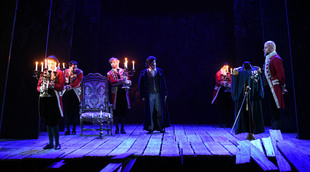 © Roberto Ricci
© Roberto Ricci
It is Verdi country here around Busseto, where the Maestro was born, brought up and quickly returned once his career has started and he soon became a real celebrity and political symbol with his dramatic operas full of heroes and virtue. Busseto is a small sleepy town in the North of the country, in the middle of the fertile heartland of Italy, the Padana. Verdi was always proud of being a farmer and he loved to be one, which he successfully was most of his lifetime. He shared his wealth with the population of the area and donated a lovely little opera house to the inhabitants of Busseto. Built into the old castle of the Pallavicino family, it is a small but fully equipped baroque theater with a tiny but luxurious foyer and stairs, two level of boxes and an orchestra pit, which slides beneath the small stage. With its capacity of three hundred people, it is just a miniature but architectural juwel. The Verdi Festival based nearby Parma includes the theater in its programme every year, with a special opera production dedicated to young talented artists, having participated at the international competition of Verdi Voices in Busseto.

This years festival concentrates on the relation between Verdi and Schiller. Die Räuber was young Schiller' s first success, I Masnadieri was young Verdi's musical transformation of the story of the two brothers full of intrigue, fight for power, love and honorable manship. Once the audience is seated, the natural closeness and intimacy of the ambience can be strongly felt as well as the difficulties for the singers to tame their powerful voices to the size of the room. The orchestra consists of a minimalistic capacity. Just above ten strings, some winds, brass and percussion take place mostly beneath the stage which has been extended with some wooden boards closer to the audience. Leo Muscato has reduced the stage design to some little decor as a chair or a bed, but uses expressive light design and gestures. The small stage quickly fills with the bandits around Carlo Moor, who cries about his fate being expelled from his father and beloved Amelia. Rosolino Claudio Cardile is a strong young singer, he warms up his tenor voice but lacks color and some timbre. His father and fiancé similarly mourn their loss of Carlo, just not being aware of the fatal intrigue by the other son Franz. Victor Sporyshev as Massimiliano Moor is the most impressing voice of the evening. His bass is full of warm volume and sound, light in acclamation and safe in intonation. Adriana Iozzia has a strong soprano with a lot of potential in climbing heights and needs some further shaping. Together with her realistic play and natural presence, she is very persuasive. Sagan Cuneyt Unsal needs time to show his talent in voice and play, but his interpretation of Francesco Moor was persuasive. Most of the success of the evening has to be contributed to the clever and sensitive conducting of Simon Krecic. He sensed tempi, modulation of loudness, variation of feelings were the best. With the reduced means, he composes a perfect sound envelope fitted into the intimate ambience of the theater. It was early Verdi full of young temperament, untamed braveness and wildness, heroic dramatic conflict and warm true love. The spirit of the Maestro was there in and out of his opera house. Even you have the feeling that he is on the way to stand up and to leave when you watch his monument in front of the opera house he is still here and will always remain.
Helmut Pitsch
the 25 of October, 2016 | Print
Comments